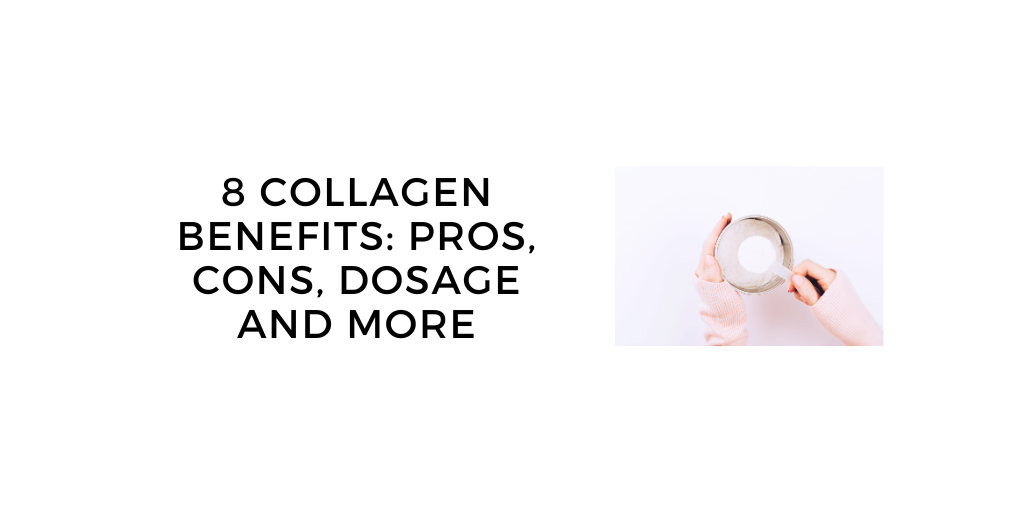
8 Collagen Benefits: When to Take, Dosage, Supplements, Collagen Foods and More
Health Benefits of Collagen
For years naysayers disregarded collagen’s nutritional merit, citing its poor amino acid profile. In reality, there are many unique health benefits of collagen that no one is talking about.
Some still think collagen is a low quality protein source with little upside. Incomplete proteins lack the balance of amino acids needed to make them complete, leaving them less effective for building muscle.
If you’re interested in building muscle, this article are not for you. However, if you care living a long, pain free and productive life, read more, because these collagen benefits are fascinating.
You'll learn how conventional thinking about protein misses the point with respect to collagen.
First a quick disclaimer: bone broth is the best natural source of collagen you will find anywhere.
I always recommend it in place of collagen because it's a whole food with extra nutrition than just collagen.
You can find the highest quality bone broth from Bluebird Provisions.

Collagen Benefits include:
- Skin health
- Joint Health
- Gut Health
- Blood Sugar Control
- Brain Health
- Sleep
- Longevity
Researchers are now seeing collagen as the multifunctional powerhouse that it is. There’s evidence to suggest eating collagen rich foods will benefit everything from joint pain to neurodegenerative diseases like Alzheimer's.
What is collagen?
Collagen makes up about a third of the protein in your body. It is mostly found in your tendons, ligaments, bone, cartilage and skin (1).
Think of collagen as a hard, fibrous protein which holds our bodies together and gives our skin a natural elasticity. How hard do you ask? Type 1 collagen is stronger than steel when stretched (2). In fact, the majority of your connective tissue is made of collagen.
There are 28 different types of collagen, however, for our purposes only types 1, 2 and 3 are relevant as they make up 90% of the collagen in your body (3).
Collagen is secreted by connective tissue cells, where it forms the structural part of the extracellular matrix (4). This is the physical scaffolding in all tissues and organs: including your gut lining and skin.
Our bodies ability to naturally produce collagen slows as we age. Collagen production is further disrupted by sun exposure, environmental pollutants, alcohol, smoking and stress (the usual) (5).
This led researchers to start looking at how consuming collagen may benefit.
You can read about other collagen boosting strategies here.
This all sounds great, but why is my friend touting collagen benefits as the best thing since sliced bread? Good question.
The blend of amino acids found in collagen is unique because they are deficient in our western diet. Unless you consume a lot of animal skin, small bones (think sardines or anchovies) or bone broth, it is difficult to get collagen in your diet.
Curious how bone broth fits into this? Read our report on the difference between collagen and bone broth.
For this reason collagen’s health benefits extend far and wide.
Here are some crucial collagen health benefits
Crucial collagen health benefits include blood sugar control, sleep, glowing skin, joint health, longevity and well being. You will learn each of these in detail plus when to take collagen to support each benefit below.
First a quick note. I would argue bone broth provides you more health benefits than collagen.
Click the image below for details.
1. Collagen Benefits Your Skin, But There’s a Catch
There's always a catch!
As we age, our natural collagen production decreases leading to a gradual deterioration of our hair, skin, teeth and nails. You see this visibly in wrinkled skin or osteoporosis.
Collagen got its fame as a nonsurgical remedy in the beauty and health scene for combating wrinkles.
It is thought to do this by forming fibroblasts (or specialized cell clusters on your dermis) which facilitate the growth of new cells (6). This helps replace dead skin with new youthful skin.
What you get wrong about collagen and skin health
Most people miss the point with collagen and skin health. Why? Because of the way most collagen is presented to you.
The catch is that no research shows the beneficial effects of collagen in topical form. Let that sink in for a second.
Why is this the case? Collagen molecules are too large for your skin to absorb them, rendering collagen based skin care products useless (7). Your money is better directed elsewhere as there are no benefits.
Luckily, there are health benefits when you eat collagen. Through a collagen rich diet you’ll improve your skin’s appearance from the inside and out.
There’s a growing stack of research showing an increase in skin elasticity from collagen supplementation after eight weeks (8).
Skin elasticity sounds fancy, but what is really going on here? Skin elasticity is increased by repairing damaged collagen fibers, increasing collagen content and restoring the ratio of type 1 to type 3 collagen in chronically aged skin (9).
Replacing damaged collagen fibers with new collagen is what restores your skin’s hydration status. You develop an abundance of connective tissue making your skin appear more smooth and supple.
The same mechanism works on your hair and nails. Although most research focuses on skin.
Regardless of the research, celebrities are using collagen for its benefits. Here is what Kourtney Kardashian thinks.
"It has hyaluronic acid so it's really good for your skin. And of course, collagen, which is great for skin, hair, nails—so many benefits."
Looking for a supplement recommendation? Read my guide to finding the best collagen powder for weight loss.
2. Collagen May Help You Digest Food Better
As I stated above, collagen is a protein made up of a bunch of individual amino acids. The single most beneficial amino acid in collagen is glycine.
You’ll be hearing a lot more about glycine in the next couple of years because it does so many great things in your body. Read our companion piece about the health benefits of glycine.
Think of glycine as a saviour to your gut. Glycine is the master at regulating inflammation in your stomach, small intestine and GI tract (10).
Inflammation is caused in your gut when harmful toxins are able to pass through your digestive tract in your gut.

These toxins in the form of food particles now have free reign to pass into your bloodstream, kicking off all sorts of inflammatory issues in your body. No bueno.
Glycine helps reduce inflammation by forming connective tissue which protects the mucosal barrier of your gut. This helps tighten the tiny junctions in those suffering from leaky gut syndrome.
We know that glycine builds up the tissues that line your gut, colon and intestinal tract. It follows that supplementing with collagen or glycine can benefit a plethora of gut issues.
Research is confirming this. Glycine is being used to manage ulcerative colitis, Crohn’s disease and inflammatory bowel disease due to it’s protective effects on intestinal absorptive cells (11).
It also has been shown to have other protective benefits on the small intestine during injury and improves fructose malabsorption (12, 13).
3. Reduces Pain in Your Joints and Tendons
Everyone gets injuries at some point. They suck! But there is some good news about how collagen benefits joint, ligament and tendon injuries.
Well designed studies are demonstrating that collagen hydrolysate shows an improvement in joint pain in athletes (14).
This particular study showed reduced joint pain throughout daily life, at rest and during heavy activity such as exercise, sports or weight lifting. The effective dose was 10g of collagen per day.
This works out to one standard serving of bone broth, a collagen or gelatin supplement.
More recent research is showing that collagen or gelatin taken with vitamin C assists in tendon repair and injury prevention.
There’s a protocol outlined by the researchers that is changing how we think about rehabbing tendon and ligament injuries.
They used gelatin as it is a more cost effective alternative to collagen. For our purposes they are interchangeable, I’ll discuss the differences at the end.
So what’s the protocol? You take 15 grams of gelatin with vitamin C approximately 1 hour before you exercise, perform rehab or your activity of choice (15).
For example, in achilles rehab, the researchers recommend 8 minutes of jumping rope after the gelatin + Vitamin C.
The timing is crucial as the activity helps shove more collagen into your tendons, ligaments and joints.
Compared to placebo, the gelatin + Vitamin C group had double the amount of collagen in their blood, leading to improved movement mechanics and treatment outcomes.
Why Vitamin C? Vitamin C is known to stimulate collagen synthesis, so it is always great to include in your diet if you’re recovering from injury (16).
Side note: this protocol worked wonders for me personally (although I substituted bone broth for gelatin) in rehabbing a plantar fascia rupture. This is why I started my company.
The tendon stimulating health benefits of collagen also helped many friends whom I’ve introduced the protocol to. They’ve reported success with rehabbing mcl sprains and achilles injuries.
A take home point here is that gelatin, collagen or bone broth is fantastic insurance against ligament, tendon and joint damage.
4. The Longevity Health Benefits of Collagen
I’m convinced that our western society consumes more meat than necessary for optimal health.
Most of the meat we eat is awful for us. The popular notion to ‘eat less meat’ completely misses the point if the meat we do eat is still garbage.
This doesn’t even get into the environmental concerns, which is a topic for another day. For now, let’s talk about methionine.
Methionine is the most abundant amino acid found in muscle meats like steak. It is essential because your body cannot make it from other things. It helps your liver detoxify drugs and make certain key molecules like the hormone adrenaline.
However the often ignored dark side of methionine is that it is toxic in high amounts.
Animals who consume diets high in methionine die much younger than those eating less methionine (17). It follows that you should eat less methionine to live forever, right? Not so fast!
This is not necessary if you get enough of another amino acid called glycine which is shown to counteract the effects of methionine (18).
Your liver needs glycine in order to effectively buffer out a surplus of methionine. So the more chicken breast you eat, the more you should pay attention to your glycine intake to balance it out.
Glycine is one of the most important regulators of inflammation in your body (19, 20).
The typical western diet comes up short of the 8-10 grams needed daily.
In addition to regulating inflammation in the liver, I’ll later discuss how collagen also restores antioxidant status to promote longevity.
Glycine makes up one third of collagen, gelatin and also bone broth. If you eat lots of animal meat, consider eating higher quality (grass finished, pasture raised, etc) and slightly less.
Then you can benefit your health by adding collagen rich foods, gelatinous meats (animal skin, tendons, small bones, wings, oxtails etc) and bone broth to balance out the methionine.
5. Collagen Improves Your Mood and Helps You Sleep
Collagen is quietly being touted as a potent mood relaxer, sleep promotor and productivity booster.
Human studies are showing that three grams of glycine (found in one collagen serving) taken before bed improves the quality of your sleep (21).
You might be wondering: does glycine knock me out like Xanax? No. Quite the opposite.
You see, glycine decreases core body temperature and possibly inhibits muscle activity during REM sleep.Your body temperature naturally drops as bedtime approaches and continues to drop throughout sleep.
This may be why glycine helps you sleep however, more research is needed.

Interestingly, there are other mood boosting effects that give us more insight as to why glycine helps with sleep. Studies are showing glycine to be an inhibitory neurotransmitter, much like GABA.
Glycine increases serotonin levels without increasing dopamine levels (22). Which is generally good. Among other things, this helps maintain healthy circadian rhythms leading to better sleep.
In addition to normalizing sleep, glycine also helped alleviate the symptoms of sleep deprivation.
The cool thing here is that glycine was shown to help with subjective feelings of anxiety related to work performance and energy throughout the day (23).
People also reported improvements in concentration during work, “liveliness and peppiness” and memory recognition, with a reduction in uneasy feelings (24, 25).
We all have energy highs and lows throughout the day. Anything that may smooth out these ebbs and flows is welcomed in my books!
So if you are sleepy during the day or have trouble falling asleep at night, it is worth getting some of the sleep benefits of collagen.
One serving of bone broth, gelatin or collagen will have the three grams of glycine needed for sleep benefits.
Personally, a mug of bone broth an hour before bed puts me right to sleep at night.
6. Collagen Boosts Brain Health
Anything that helps you sleep better should be celebrated. That being said, the mood boosting benefits of collagen extend further to brain health.
Not many are writing about this, but researchers are finding a positive impacts on patients with schizophrenia who supplement with glycine as part of their regiment.
Glycine is useful for treating the negative symptoms of schizophrenia: mainly depression and loss of mental fluency. It even improves psychotic symptoms in some cases (26, 27).
Since the negative symptoms of schizophrenia have such devastating effects on the sufferer's ability to function in the real world, the finding that glycine may help is significant.
You’d have to consume a lot of collagen to match the high glycine dosage (25 grams) in this research is but it is worth mentioning regardless.
The benefits of glycine on the brain may extend to other psychiatric and mood disorders.
There is promising mechanisms to suggest that glycine assists with depression and neurodegenerative disease like Alzheimer’s and Huntington’s.
Also, glycine protected the neurological damage caused by a stroke (28, 29).
The cognitive enhancing effects apply to healthy individuals as well. Normal people show an increase visual, verbal memory recall and improve sustained attention when taking glycine.
This suggests that collagen can benefit you in situations where high retrieval of information is needed or when performance might be affected by poor sleep, jet lag and shift work (30).
Keep in mind that it is early. However, there is lots to be exciting about for collagen’s effects on productivity, cognitive disorders and neurodegenerative diseases.
7. Boosts Antioxidants and may Protect you from Asthma
I’ll take a guess that you’ve heard how antioxidants are good for you. Everybody knows that. But how?
Antioxidants prevent oxidation. Oxidation leads to cell damage. Your body creates oxidants to fight off viruses and microbes. But if you produce too many then bad things happen: think cancer, heart disease, etc.
Unless you live in a bubble, you’re also exposed to oxidants in your daily life. So you do your part by eating blueberries and maybe taking Vitamin C when you’re sick.
Glutathione is recognized as the master antioxidant in the cell. We are deficient due to environmental factors like stress, infections, aging, air pollution, GMO’s, etc.
Researchers are showing that glutathione is an important predictor of longevity (31, 32).
You might be asking: can I mainline glutathione into my bloodstream and live forever? It’s not quite that simple.

That being said, the production and availability glutathione is largely based on glycine. Yes the same glycine from collagen that I keep harping on.
It is one of the three amino acids that your body uses to create this master antioxidant. In fact, glycine supplementation is shown to directly increase glutathione in your cells (33).
If you’re not getting enough glycine, then your body is not turning over new collagen and glutathione status is suboptimal. These have major implications for your body’s exposure to oxidative stress (37).
Oxidative stress increases the risk of some cancers, joint issues and musculoskeletal injuries (38, 39).
Oxidative stress also explains why we get asthma. Glutathione is crucial to the fluidity of mucus in your body. Sounds gross but bear with me. You get respiratory issues when the mucus in your respiratory tract is not fluid enough.
Proper levels of glutathione is protective against asthma and other lung conditions (40). If you want to live a long and healthy life, you should be paying attention to your glutathione status.
At this point you might be asking why this article is about collagen health benefits instead of glycine. It turns out that glycine on it’s own is poorly absorbed.
There is something about the balance of amino acids in collagen that makes for better glycine absorption.
As you can see, collagen’s research is promising but it is early.
8. Blood Sugar Control and Heart Health
Approximately 8% of Canadians suffer from diagnosed diabetes. 90% of that is type 2. Type 2 diabetes is caused by lifestyle and environmental factors (41).
Research suggests that glycine (which makes up ⅓ or collagen) taken with meals can help control insulin and blood sugar (42).
What’s cool is that when you have high glycine levels in your body, you are less likely to be obese or have insulin resistance (43).
Glycine also helps you stabilize blood sugar. Taking one serving of collagen in the morning (3-5 g of glycine) stabilizes blood sugar (44).
Glycine seems to make our bodies more efficient with glucose. It does this by releasing gut hormone to help digest glucose more efficiently.
Also, collagen and glycine helps to balance out methionine intake. Muscle meats like steak and chicken breast are high in methionine.
Methionine is inflammatory and expedites aging (45).
Glycine helps to reduce the inflammatory effects of methionine (46). The more animal protein you eat, the more collagen you need to balance out methionine.
How do I get more collagen?
The major caveat is that all collagen and gelatin come from animal sources, so unfortunately it is not vegan friendly.
Bone broth powder is the best way to get collagen in its whole food form. It is full of collagen protein and electrolytes.
With that out of the way, I’d recommend getting collagen from food sources first, supplements second.
You get maximum health benefits from collagen in whole food form. For food sources you need to think about eating nose to tail. It is the way nature intended us to consume animals.
Here are a few foods high in collagen:
- Bone broth
- Skin
- Bones of small fish (anchovies, sardines)
- Organ meats are great collagen sources
Skin and organ meats may sound weird to you. That is okay.
Chances are your grandparents ate a steady diet of liver and onions, steak and kidney pie. They were on to something.
Make a small change first by eating the skin of any animal protein you’re consuming. For example don’t throw out your fish or chicken skin after you cook it. This is a great source of collagen.
Finally, a high quality bone broth gives you 7-10 grams of collagen per one cup serving. One cup per day covers your nutritional needs.
If you are looking for collagen supplements keep in mind they are processed using either heat or enzymes to extract the collagen. This may make them more difficult to absorb for some than natural sources.
The sourcing of organic, ethically raised animals to make these supplements is impossible at the price points they are sold at. Meaning that you are likely supporting imported products.
Trust me because I've looked at manufacturing a certified organic collagen. Non of the suppliers meet my ethical and quality standards.
I understand convenience is important. So if you still are looking for a collagen supplement, I’d recommend you read my top collagen supplements for skin health guide. This ranks all of the best ones according to my high standards.
The company should list where the animals are sourced from on their website. If they don’t I see it as a red flag.
There are also some marine collagen supplements. Many report the taste is to be less than inspiring.
Which foods have the most collagen?
The foods that have the most collagen are bone broth, gelatin, animal skin, chicken wings/feet, oxtail and cheaper, more tough cuts of meat.
What’s the difference between collagen and gelatin?
The difference between collagen and gelatin is that gelatin is essentially a heated (or hydrolyzed) form of collagen. There is also hydrolyzed collagen supplements. In this case, the collagen is extracted using heat (or enzymes), but not enough heat to turn it into gelatin.
Cooking collagen helps to isolate and form gelatin. Gelatin forms a familiar gel like texture (jello-o!) when mixed with water, while collagen does not. This is worth mentioning if you want to use it for cooking.
Hydrolyzed collagen is thought to be superior than gelatin. However, they have an almost identical amino acid profile, thus share the health benefits.
Most people find gelatin easier to digest as the gel consistency gently soothes your stomach and intestines.
I prefer gelatin because of the thickening properties in cooking. It is great to thicken smoothies, or in sauces, soups and stews. Gelatin also tends to be less expensive than collagen supplements.
Closing Thoughts
There are many potential benefits of taking collagen supplements, but more research is needed to confirm these effects for certain things. There is solid research for skin health and some for gut healing.
Other things do not have the science yet. That does not mean it will not work, just that we have limited studies on it.
If you're considering taking collagen, be sure to talk to your doctor first to see if it's right for you. You may also want to try incorporating collagen-rich foods into your diet, such as bone broth.
And if you're looking for a recommendation, I love the chicken bone broth powder from Bluebird Provisions. It has 10 grams of collagen per cup and it tastes absolutely delicious.
FAQ Section
What are the side effects of taking collagen?
The side effects of taking collagen are, digestive issues, kidney stones and histamine reactions. Read the detailed explanation of what these mean below.
- First, some people experience digestive issues with collagen.
- Second, If you’re prone to kidney stones or have a high level of calcium oxalate crystals in your urine, then you should be careful with taking collagen.
- Lastly, If you have histamine intolerance, then you should be careful when consuming collagen or gelatin. Some people report histamine reactions when taking collagen.
What is the best time to take collagen?
If you’re having digestive or gut issues then the best time to take collagen is first thing in the morning on an empty stomach or with your meals.
For joint, tendon or ligament pain the best time to take collagen is approximately 1 hour before you exercise for best results (be sure to include 50 mg of vitamin c). The timing is crucial as your exercise activity helps to shuttle collagen peptides into your tendons and joints
For restful sleep, the best time to take collagen is before bed for improved sleep quality.
To help control blood sugar the best time to take collagen is before our meals. Take 15 g of collagen for maximum health benefits. This will provide the 3-5 g of glycine necessary to help control your blood sugar response.
Should I take collagen everyday?
You should take collagen everyday in some form. However, the best form of collagen is from whole food sources like bone broth. For this reason, you should start by incorporating more collagen rich foods in your diet, like bone broth. Food is medicine. From there you can experiment with taking collagen.
How long do you have to take collagen before you see results?
You can see results from collagen within 8 weeks for ascetic skin health benefits.
For joint and ligament pain or osteoarthritis, studies show that collagen can improve healthy outcomes in 3 months.
Collagen will instantly help you control your blood sugar.
Is it better to take collagen at night?
It is better to take collagen at night if you are having trouble sleeping. Glycine, an amino acid that makes up about 1/3 of collagen, helps you relax, lowers your body temperature and prepares you to sleep.
Glycine acts as an inhibitory neurotransmitter (similar to GABA). This is the reason for the proposed sleep benefits of collagen.
Can you use collagen for your skin?
You can use collagen for your skin, but topical collagen does not reap the same benefits as eating collagen or collagen rich foods.
For this reason you must add collagen rich foods to your diet, then you can consider a collagen supplement. Topical collagen creams do not benefit your skin because the particle size is too large to get into your skin.
Is collagen good for bones?
Collagen is good for bones because it is the protein in our body that strengthens and supports all tissues, including bones, muscles, skin and hair. It keeps us young by fighting off signs of aging like wrinkles, sagging skin and hair loss. It is also an essential component of the bones, cartilage and teeth.
Disclaimer: this information is for educational purposes only and has not been evaluated by the FDA or CFIA. It is not intended to diagnose, treat, cure, or prevent any disease. Please consult your primary care physician for advise on any of this.

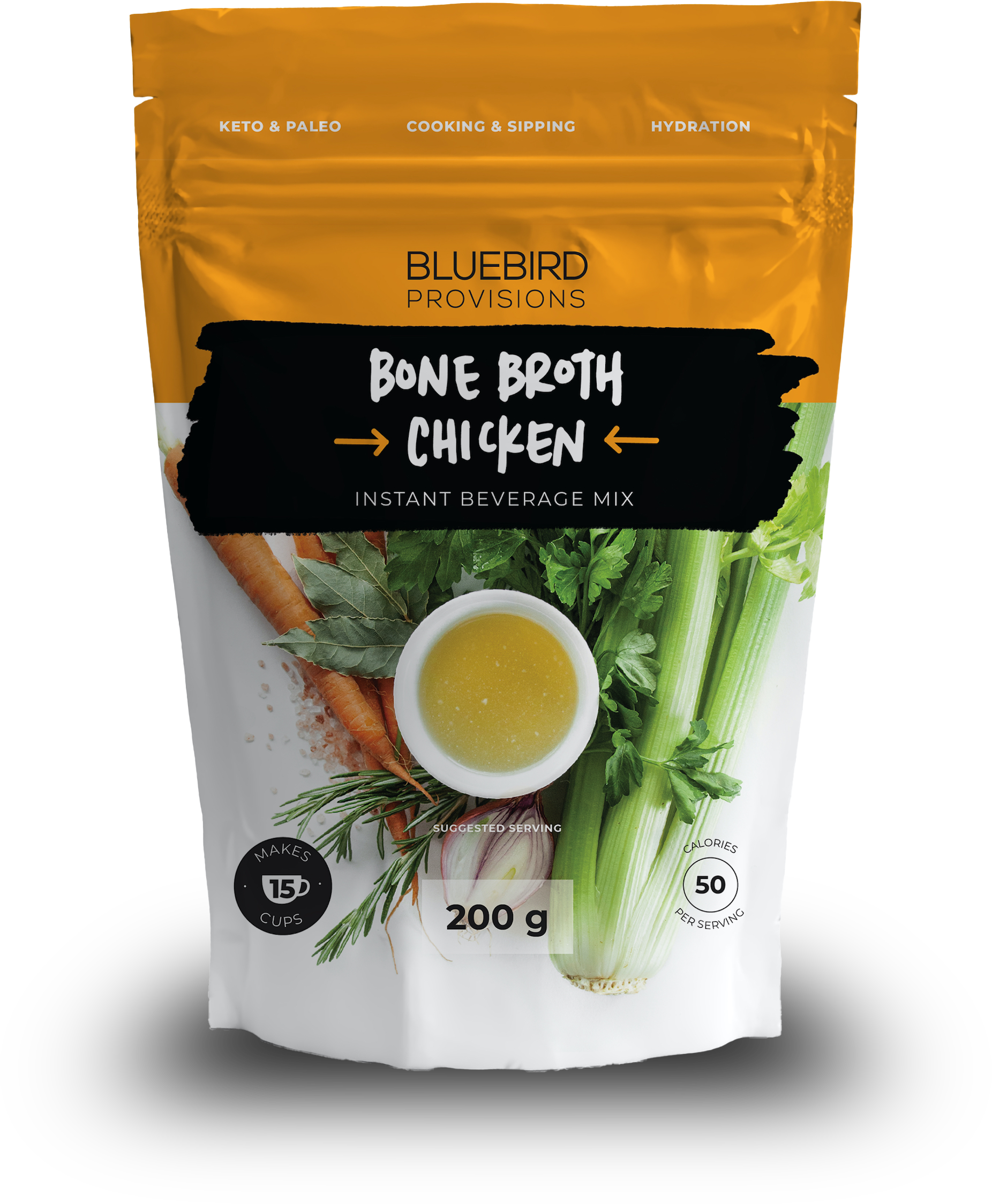
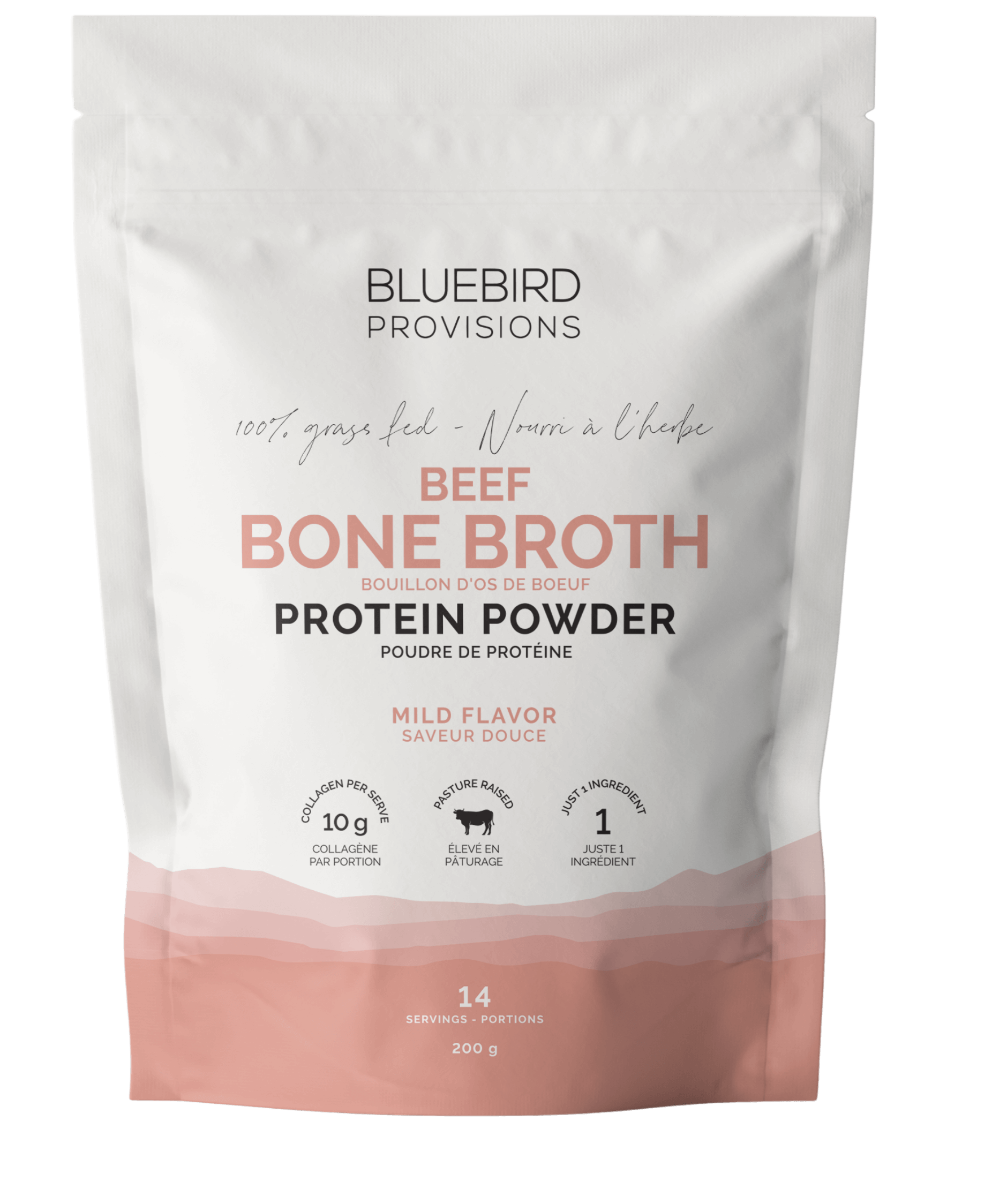

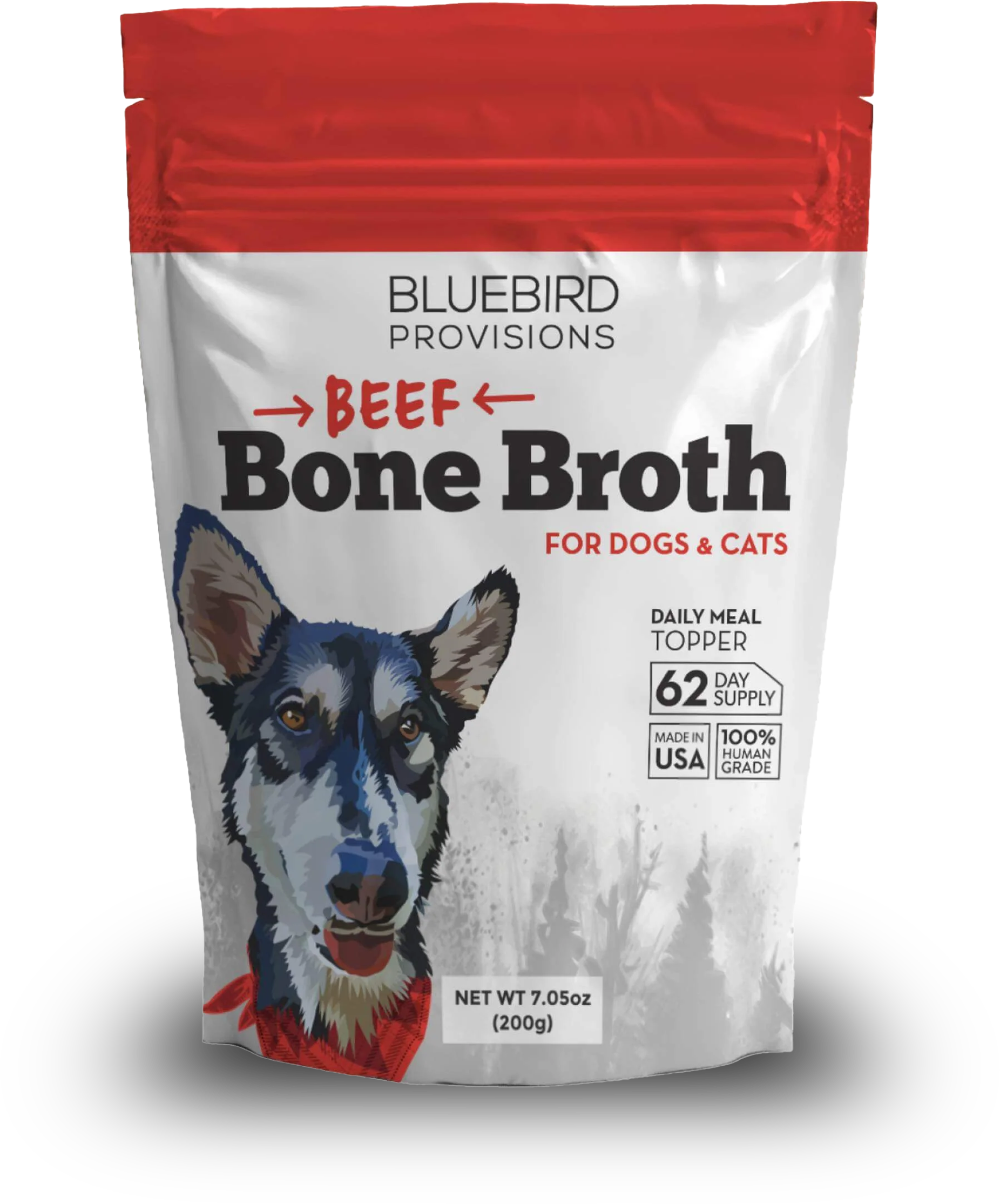

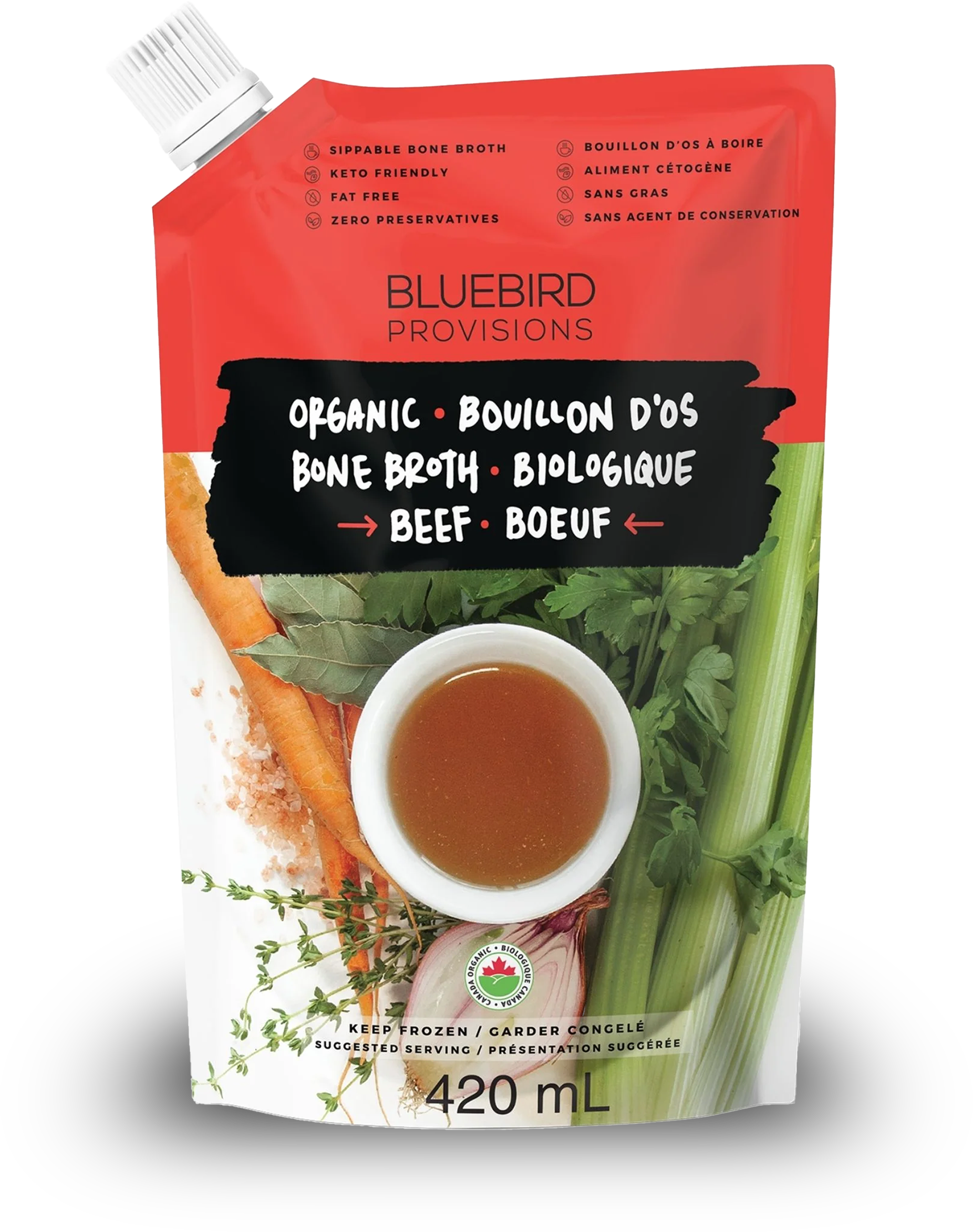



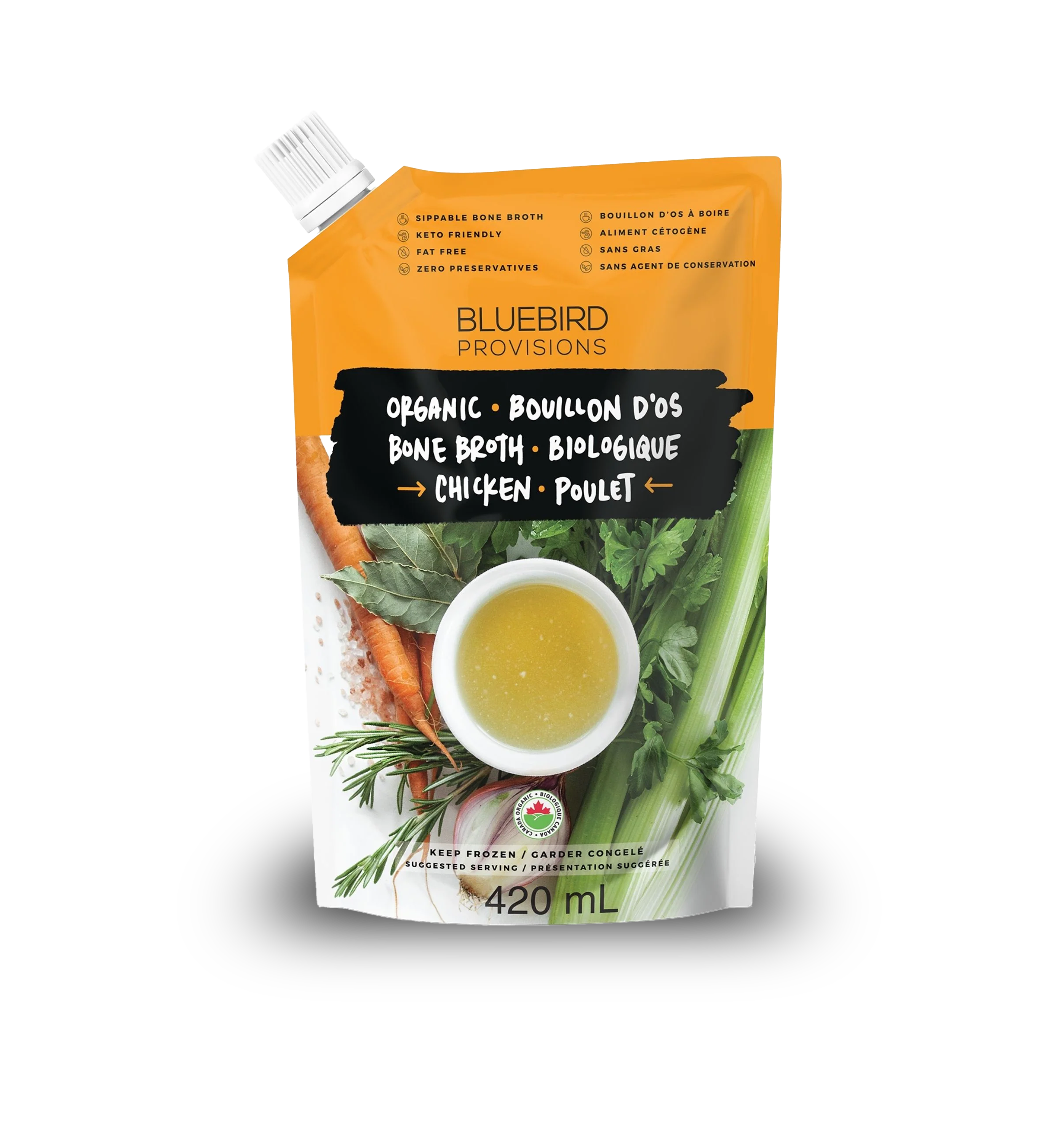
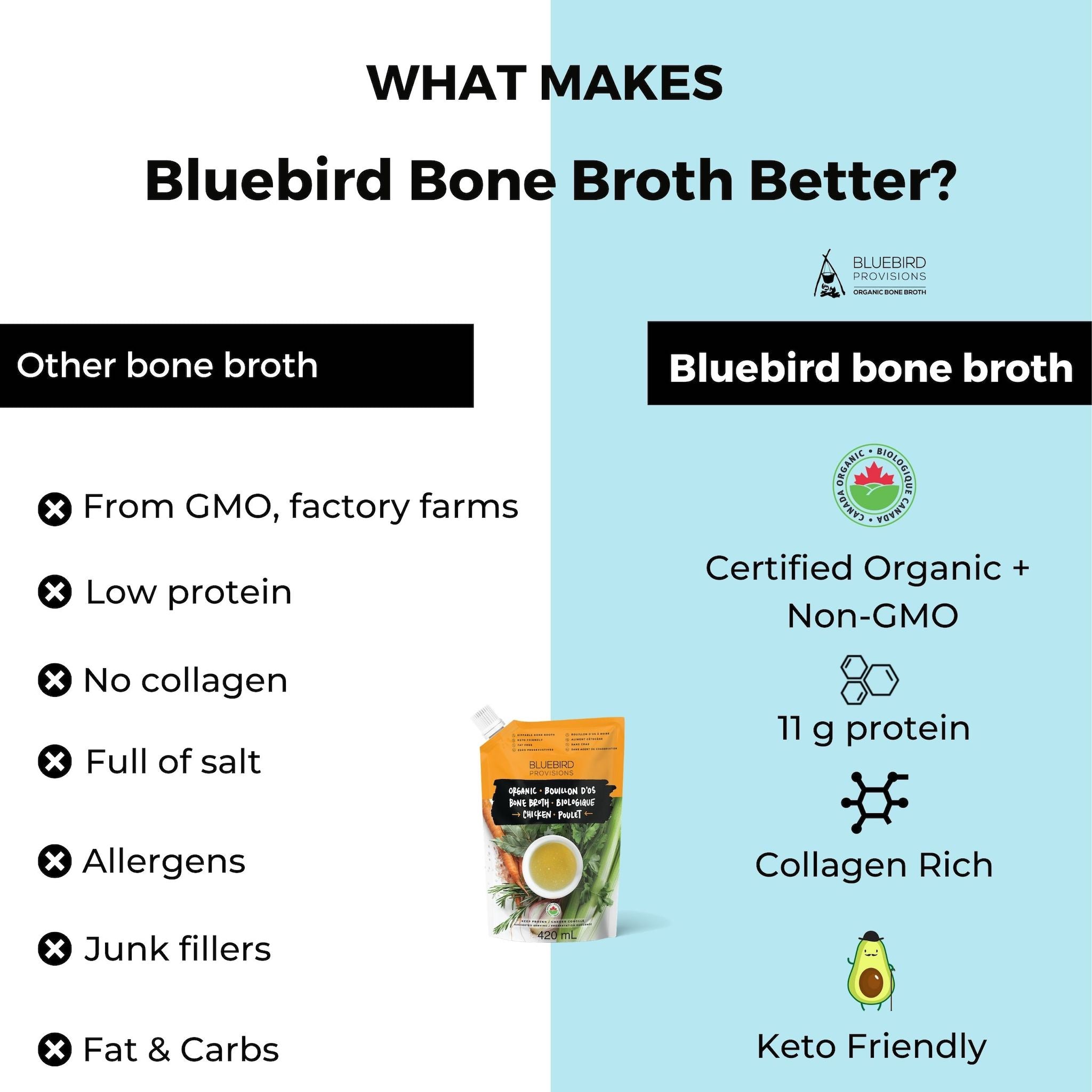
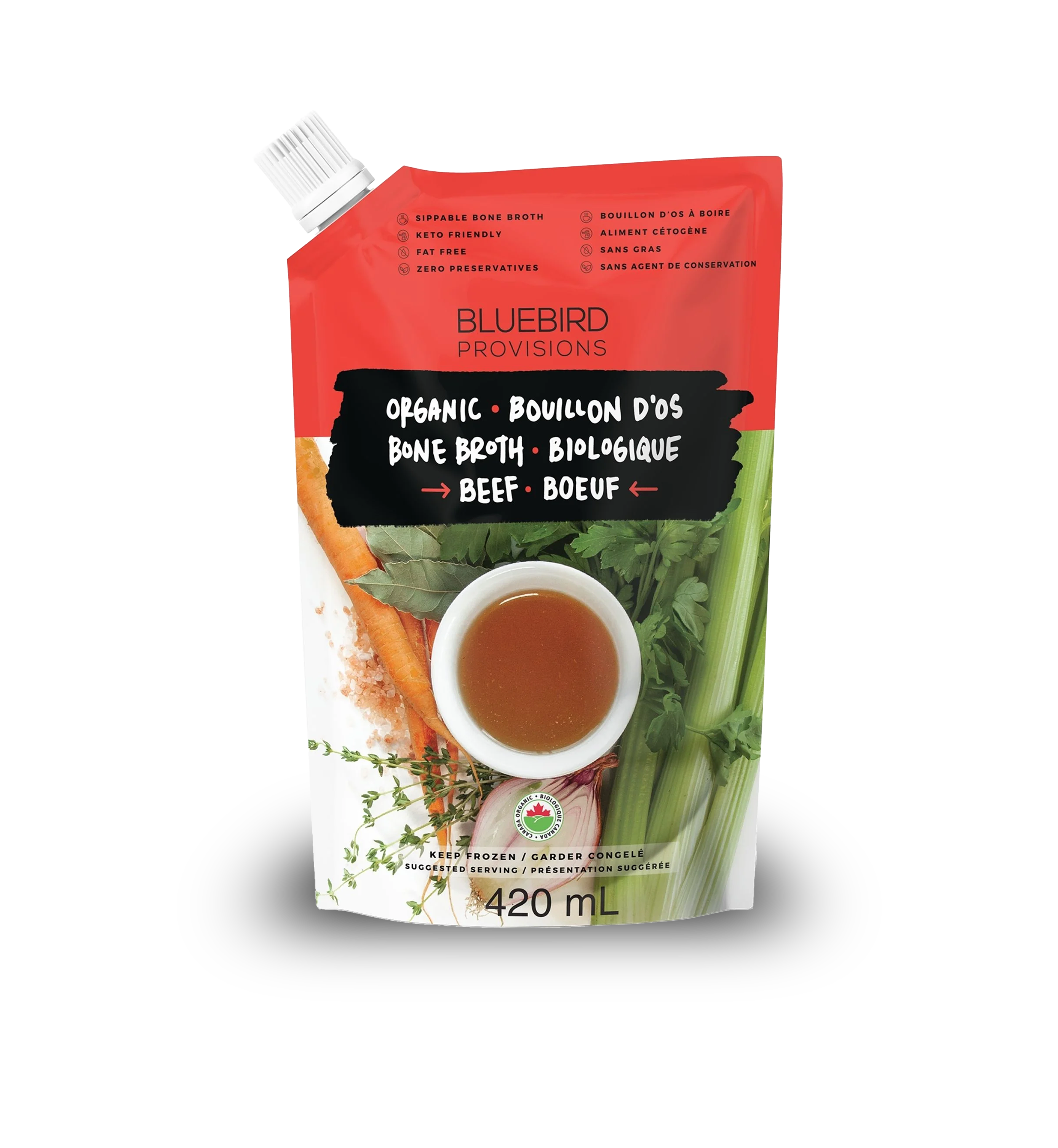
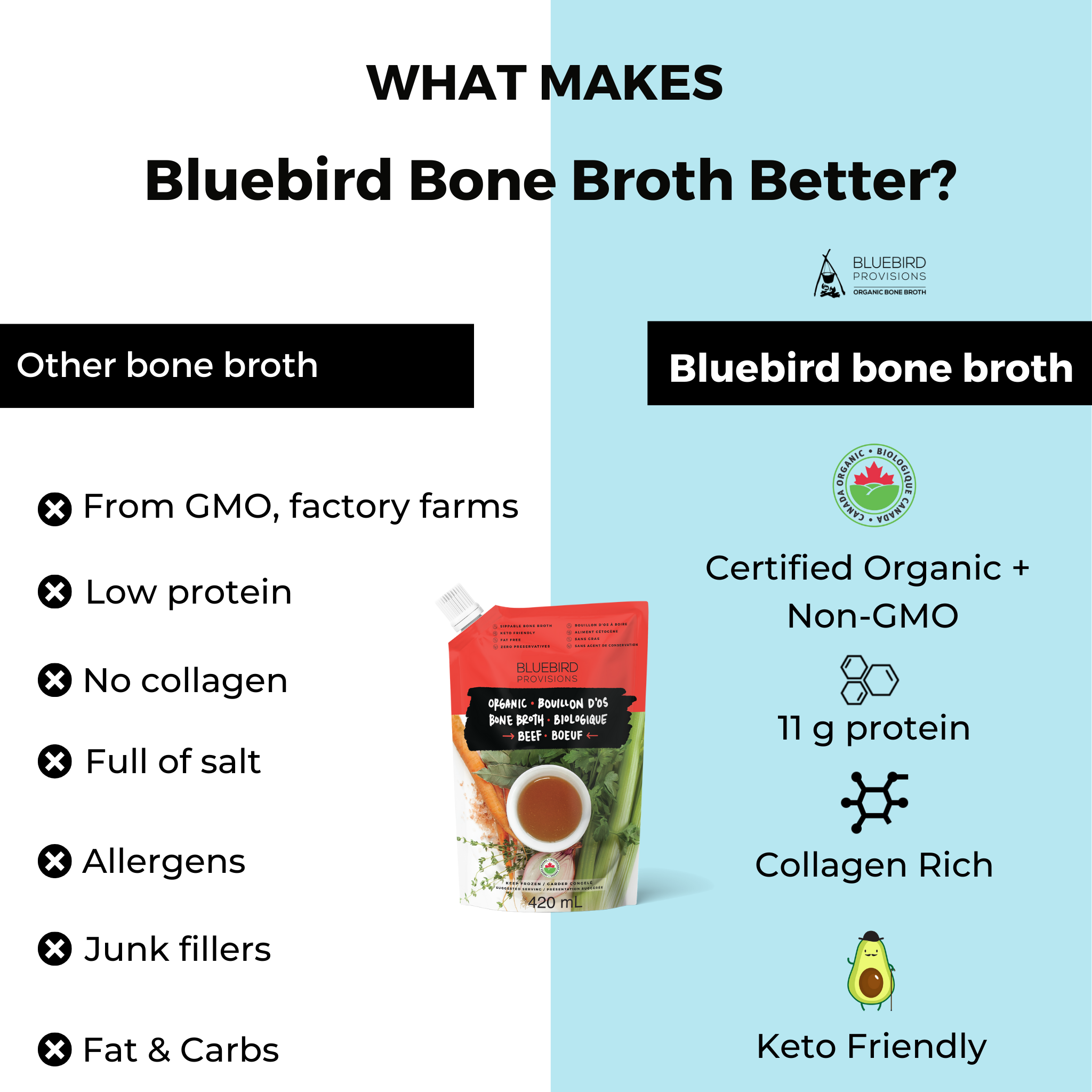
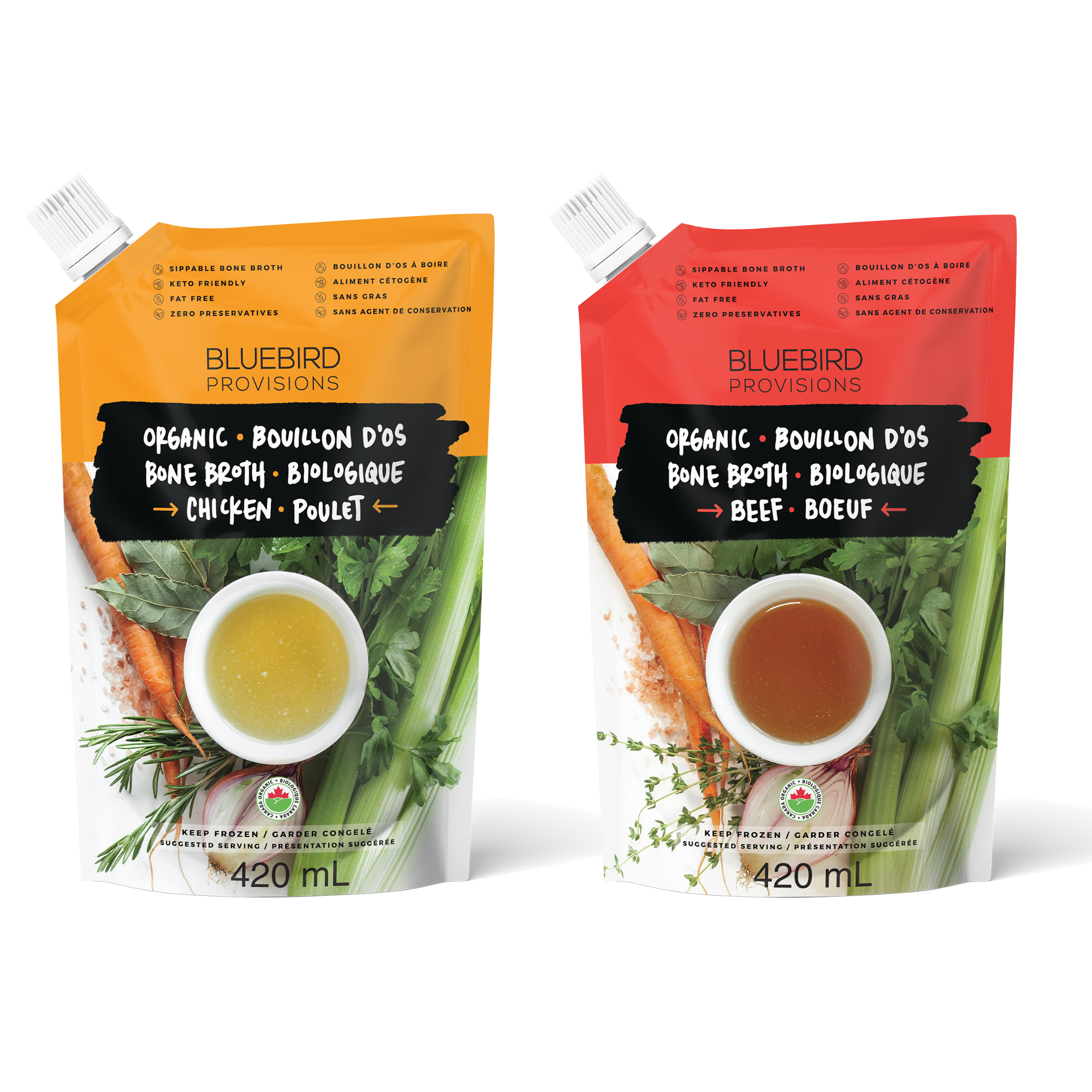

26 comments
It may help for that. Hard to tell. You could try bone broth as well.
Connor at Bluebird Provisions
What about tailbone injury pain? Is that considered to be a joint?
Stephanie
Hi Hitesh,
There is some information about marine collagen in this article here: https://bluebirdprovisions.co/blogs/news/where-does-collagen-come-from
Let me know if you have any questions after reading.
Connor at Bluebird Provisions
Hello from India,
Thank you for this informative and detailed article about collagen. I am going to start Marine collagen supplement for mainly skin and aesthetic purpose. Would it be possible for you to elaborate a bit on that please. It would be of great help.
Thanks in advance.
Hitesh
Thank you for sharing valuable information. I got so much important informative knowledge from your blog.
bonKind LLC
Hi Chu,
I would recommend 15g of collagen per day to see some benefits. You can also get this by drinking one large mug of bone broth per day.
Hope this helps and let me know if you have any other questions.
connor
Connor at Bluebird Provisions
Hi Connor, I really enjoy reading your articles. May I get your advise on what the minimum mg of collagen per day, in order to see the skin improvement in 8 weeks?
Thank you
Chu Hoon Ding
Connor, I am excited to learn more, I am a new collagen peptide supplement user, and already feel less aches… I’m in heaven, this article I saved to my phone, I grew up with bone broths, and I’m trying to learn as much as I can now on the health side of this adventure,, my grandparents had no concern about temperature except the hotter the better haha and no use for vinegars in the broth… my mom was the same, thank you for posting this, bone broths r going to become a routine now … hugs from ohio
Tammy Null
Hi Louzana,
I would definitely stop taking collagen (like you have done) in your case. I don’t feel qualified to weigh in, so you are best to ask your doctor or primary care physician.
Sorry! I wish I had an answer for you.
Connor
Connor at Bluebird Provisions
Hi Loretta,
As I am not a doctor I dont feel qualified to answer your question about collagen clogging arteries. Sorry! Best of luck.
Connor
Connor at Bluebird Provisions
I just wanted to ask, i took collagen for 2 days noticed migraines and dizziness inability to focus, and then stopped it,
I really want to give it a try, do these side effects usually pass when your body gets used to it or do they never go away as long as you’re taking it.
Louzana
Will the collegen clog arteries? I have two stents in my heart.arteries. The one was 95% blocked.
Loretta
Hi Annie,
Thanks for sharing. That in really cook that the gelatin helps you. I mix it with my dairy free yogurt and it helps keep me phlegm free as well. I used to have the same phlegm throat after any dairy. Gelatin helps me as well.
Connor
Connor at Bluebird Provisions
Hi Mr Williams,
Unfortunately we do not ship to the USA at this point. We do have our new chicken bone broth powder that will be available to ship to you in the USA starting in March. I will email you when it is available to order. All the best!
Connor
Connor at Bluebird Provisions
I’ve been coughing up phlegm for years, especially after drinking anything with milk in it. It’s gotten progressively worse with wheezing too. Living somewhere that had black mold in the ventilation system really made it worse. I’ve been taking Mucinex for years because of this. One day after mixing gelatin into hot cocoa and then incorporating gelatin supplements too made it all stop immediately. I don’t cough anymore. Phlegm is gone. I think it cured my snoring. I’ve never been able to breathe so clearly like this, even as a kid.
Gelatin is amazing. It’s only been 4 days!
Annie
Thanks for your comment Lelanie.
Yes there are many physiological benefits of collagen. I mentioned them in the article. There are sections dedicated to joint and tendon health, brain health, sleep and arthritis. Hope this helps.
connor
Connor at Bluebird Provisions
What is the physiological side effects of colagen? If any? Memory? Head aches, sleeplessness? Brain activity? Just for interest sake libido? Would be good to know? And then muscles? Arthritis? Muscle pain. There is much to say about skin&nails but what about the brain and muscles?
Lelanie
Hi
I am Mr Williams from Pompano Beach Florida.
I want to know if you ship to Florida
Hope you also accept master, visa or american express credit card.
Waiting for your reply as soon as possible.
Regards
Williams
786-749-6550
williams
Hi Meela,
Keep in mind that I am not a doctor and this should not be taken as medical advise. It is best to consult your healthcare professional for advice on this.
With that said, the research shows that 15g or collagen or gelatin with 50mg of Vitamin C before activity to be beneficial.
Hope this helps!
connor
Connor Meakin
Hi Kim!
I’m sorry but I am not qualified to answer or speak to your question. Best to consult a healthcare professional.
Sorry!
Connor Meakin
I have osteoporosis minus on my back hip and neck how many times must I take the collagen
Meela Sewpersad
Hi what is your idea of collagen and fertility issues like pcos? what other vitamis or minerals would you suggest together eith collagen?
kim d
Hi PeggySue,
Sorry to hear about your back. For your back pain and skin i would recommend 2-3 servings of collagen or gelatin or bone broth per day. It is best taken with a bit of vitamin C (50mg is enough) before meals or most importantly, before you exercise. This helps push the collagen into your joints and skin where it is needed.
Please keep in mind that I am not a doctor or health professional and none of this should be taken as medical advise. All of this is based on some research and my personal experience. It would be best to consult with your doctor.
thanks and hope this helps!
connor
More info on the research here: https://academic.oup.com/ajcn/article/105/1/136/4569849
Connor at Bluebird Provisions
I have narrowing of the spine among other back issues and I would like to get rid of wrinkles due to my age as well as sagging skin from weight loss I recently lost to lessen back pain. How much gelatin or collagen from bone broth would you suggest that I take daily and when? Thanks
PeggySue
Thanks for the comment June. I’m sorry to hear about your plantar fascia rupture and ongoing issues. It’s certainly one of the most difficult injuries to overcome and there is not a ton of precedent and info on how to treat a rupture.
Are you able to walk without pain day to day once its warmed up? Or is it generally painful on weight bearing all day? If it’s always painful then it is probably too early to expect a ton of quick progress from the gelatin or bone broth + vitamin C exercise protocol. In this more complete rest might be needed before trying any exercises.
How did you rupture your plantar fascia? Have you looked at any biomechanical or gait issues with your walking or movement? Addressing these issues also helped me personally in addition to the exercises with gelatin, collagen or bone broth.
For me very inflexible ankles from lots of sprains when i was younger contributed to the plantar fasciitis and eventual tearing. Getting better ankle mobility and foot mobility helped me out.
As far as specific exercises, I used eccentric heel drops with a towel under my toes to further lengthen the fascia under load. But again its too early to do these if you are in pain while doing them ( more than 3/10) or right after. This article has some pictures to demo the exercise: https://www.footankle.com/high-load-strengthening-for-plantar-fasciitis/
I also continued the bone broth with vitamin c before any time i went to the gym, ran or hiked as well. I still do it to this day to hopefully prevent any future tendon issues.
Lastly i’ll mention that i am certainly no doctor or medical expert, so please take any of my advise with a grain of salt. It worked for me but certainly should not be taken as gospel or medical advise.
all the best with your recovery and let me know if you have any more question.
connor at Bluebird Provisions Bone Broth
Connor at Bluebird Provisions
Thank you for your helpful article. I’m currently dealing with a ruptured plantar fascia and have made little or no progress in 6 months. I’m taking collagen now for about 3/4 weeks so far, aiming to do targeted exercises after one or two doses per day. Which exercises did you find helped you target your foot and how long before you felt benefit?
Thank you!
June Harrison
Leave a comment
This site is protected by hCaptcha and the hCaptcha Privacy Policy and Terms of Service apply.